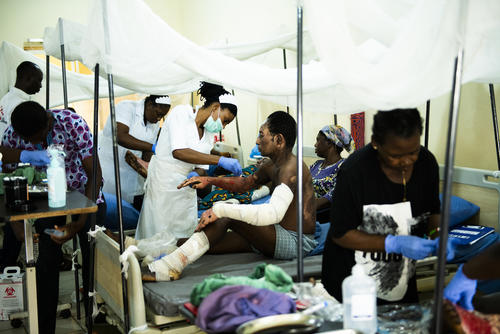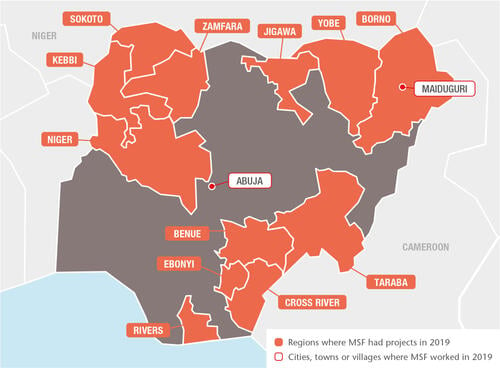
287,200
287,2
64,600
64,6
53,300
53,3

18,900
18,9
18,600
18,6
12,400
12,4

9,200
9,2
8,200
8,2
290
29
Médecins Sans Frontières (MSF) continued to assist people affected by conflict and displacement across several states, while also maintaining a range of basic and specialist healthcare programmes.
Displacement and violence
Northeast Nigeria
In northeast Nigeria, more than a decade of conflict between the Nigerian government and armed opposition groups has taken a severe toll. The UN estimates that over two million people are now displaced, and around seven million depend on aid for survival. In 2019, as the situation further deteriorated, a number of aid workers were abducted and killed by armed opposition groups. In addition, new counter-terrorism laws increased restrictions on humanitarian action.
Only people living in government-controlled areas in and around the state capital, Maiduguri, were able to receive humanitarian assistance. In 2019, in the areas we could access, we managed hospital emergency rooms, operating theatres, maternity units and children’s wards. Services included nutritional care, vaccinations, treatment for malaria, tuberculosis and HIV, as well as for victims of sexual violence, and mental health support. We also ran water and sanitation activities. Over the year, we admitted 34,900 patients for care and treated 106,300 on an outpatient basis.
In Maiduguri, we run a therapeutic feeding centre and a paediatric hospital with an intensive care unit. At these facilities, more than 7,600 children were treated for severe malnutrition, around 7,700 for malaria and nearly 6,970 for measles during an outbreak that was exacerbated by the ongoing conflict. In Gwoza and Pulka, garrison towns controlled by the Nigerian military, our teams provided emergency care to nearly 18,600 patients in public hospitals. In Pulka, we treated 74,400 outpatients, most commonly for acute diarrhoea related to a lack of clean water. In displaced people’s camps in Ngala, we treated 550 severely malnourished children and assisted nearly 1,000 births. In Rann, we conducted 9,200 outpatient consultations. In addition, we implemented seasonal malaria prophylaxis in Banki and Bama.
Zamfara state
In Zamfara, tens of thousands of people fleeing violence in the north of the state sought shelter in and around the town of Anka. In this town, our teams conducted nearly 31,800 medical consultations and distributed cooking utensils and personal hygiene products to more than 1,000 families. We observed a high prevalence of malnutrition in children under the age of five, and our teams registered admissions of nearly 12,000 inpatients and outpatients at our intensive therapeutic feeding centre in the state capital, Gusau, and hospitals in Anka, Zurmi, Shinkafi, Talata Mafara and Bukkuyum.
In addition, in Anka hospital and clinics in 11 locations in Zamfara state, we treated nearly 27,300 patients for malaria and around 920 for measles.

Benue State
In Benue state, an estimated 16,000 people who fled violence as herdsmen and farmers clashed over land in 2018 remain displaced. Around half of them live in official camps in and around the state capital, Makurdi. In 2019, our support to the Ministry of Health included carrying out more than 27,300 medical consultations, distributing relief items, building shelters, latrines and showers, and supplying drinking water inside the official camps. We also extended our activities to assist people living outside the camps. Between July and December, we supported Benue teaching hospital with surgery, counselling and physiotherapy for burns patients following an oil tanker explosion.
Cross River State
Since July 2018, we have offered care to refugees from Cameroon’s Northwest and Southwest regions and host communities. In November 2019, we handed over our activities to the Ministry of Health. During the project, we conducted close to 36,000 consultations, treated over 4,400 cases of malaria and offered mental health care to nearly 1,300 people. We also rolled out sexual and reproductive health services, including responding to sexual and gender-based violence.
Women’s health
The focus of our activities in Jahun general hospital, Jigawa state, is comprehensive emergency obstetrics and neonatal care. In 2019, our teams assisted over 13,400 births, 70 per cent of which were complicated cases. A specialised team at the hospital also performed vesico-vaginal surgery on 302 women with obstetric fistula, a condition resulting from prolonged or obstructed labour. In addition, our staff supported basic emergency obstetric and neonatal care in four other facilities in the area.
In Port-Harcourt, Rivers state, we run two clinics offering medical care and mental health care to an increasing number of victims of sexual violence. During the year, we treated 1,424 new patients, 61 per cent of them under 18 years old.
Lead poisoning and noma
In 2019, 938 patients completed chelation therapy in our treatment programme for children under five affected by lead poisoning associated with artisanal gold mining in Zamfara state. In October, together with the Ministry of Health, Occupational Knowledge International (OKI) and TerraGraphics International Foundation (TIF), we published results from the pilot programme we ran in Niger state from 2016 to 2018, showing how safer mining practices reduced blood lead levels by 32 per cent. We continue to treat lead poisoning cases, carry out operational research and advocate solutions with our partners and the federal authorities.
Noma is a gangrenous disease that causes disfigurement. It affects young children in particular, leaving scars that only complex reconstructive surgery can repair. Four times a year, we send specialised surgeons, nurses and anaesthetists to support noma treatment at Sokoto Children’s Hospital. As well as surgeries, we provide nutritional and psychosocial care and physiotherapy. In 2019, our teams carried out 170 surgical interventions and 530 individual mental health consultations. With the Ministry of Health, we also conduct outreach with a focus on early detection and treatment in Sokoto, Kebbi, Niger and Zamfara states.
In 2019, we continued to call for recognition of, and solutions to, noma, through medical conferences, advocating increased surgical capacity, and screening the MSF-supported documentary ‘Restoring Dignity’ across Nigeria and worldwide.
Lassa fever
In Ebonyi state, in response to an outbreak of Lassa fever ─ an acute haemorrhagic illness ─ which was declared a national emergency, we assisted the state and federal ministries of health and the Nigerian Centre for Disease Control with technical support and staff training at a teaching hospital in Abakaliki.

















